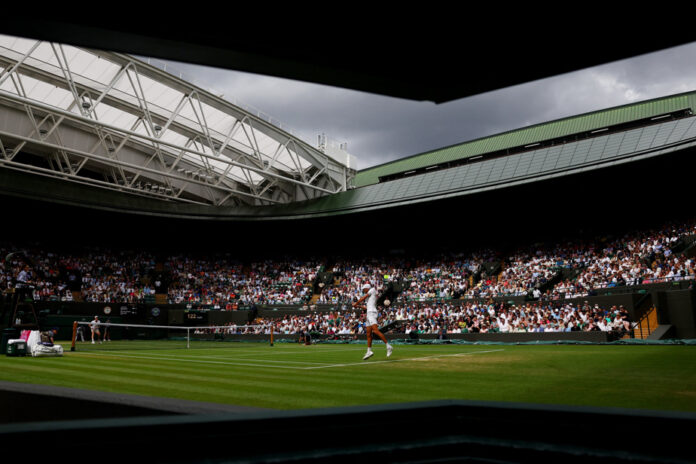“Hello, she’s gone!” “There are voices that we do not forget, that we even associate with sports. Think of Martin McGuire in hockey, Hélène Pelletier in tennis, Jacques Doucet in baseball.
But are these jobs as descriptors or commentators threatened? For the first time in its history, Wimbledon uses artificial intelligence to describe matches. Martin McGuire and Rodger Brulotte gave us their opinion.
“Jabeur, ranked 6th in the world, is hoping for the second victory of her career against Andreescu, ranked 50th. It is not a human who describes the highlights of the match between the Canadian and the Tunisian on the Wimbledon website. It’s a robot!
IBM, a longtime sponsor of the tournament, announced in June that it had developed artificial intelligence-generated commentary. The company fed a machine with thousands of tennis videos for the robot to understand the vocabulary and intricacies of the racquet sport.
Even if the result is not perfect, IBM hopes to one day hear the robots during events broadcast on prime time television. “This introduction is a step to making that commentary available, in an exciting way, for non-Wimbledon matches that already have human commentary,” the company said in a statement.
However, the comments published on the Wimbledon site are general and not very detailed. “Jabeur hits a serve near the line and it’s too good for Andreescu. She wins the round,” the android narrator explains in a neutral tone, before the third round.
And there are the voices that need to be perfected. The Atlantic compared that of the female robot to actress Helen Mirren who allegedly got hit with a cricket bat, and that of the man to an uncle who tried to imitate Hugh Grant.
These stammerings of the description of matches by artificial intelligence do not really worry, not even at all, Martin McGuire.
“A machine, for sure, it won’t make mistakes, it won’t sputter, but I think people who follow a sporting event, what they want is to be transported by the ’emotion,’ says the man who has been describing Montreal Canadiens games for 21 years on the radio.
“I don’t think a machine can ever replace that,” he adds in an almost melodious voice next to that of a robot.
Martin McGuire cites the example of Canadian cyclist Michael Woods, who won the 9th stage of the Tour de France on Sunday. “It’s truly exceptional, what he’s achieved. He leaves, he goes to look for the one in front of him in the middle of the climb. He clicks it, like a good Quebecer, and there is nothing better than a human voice to describe it all, ”he continues.
The colorful Rodger Brulotte also believes his co-workers don’t have to fear for their television and radio jobs. “With AI, you’re still going to get the same style of description, but you won’t hear passion. It’s all well and good, a generic voice, but passion. Passion ! “, he insists vigorously.
Rodger Brulotte recalls that TV channels have already tried to present sport without description or commentary. The streaming site Peacock, for example, showed a game between the Kansas City Royals and the Detroit Tigers in baseball last year, without commentary. Fans had to settle for the sound of the ball banging into the stadium, the voice of the house announcer and the reactions of the crowd. The experiment turned out to be a failure and was not repeated.
Closer to home, Radio-Canada also had to present La soiree du hockey sans description during the strike by journalists and production staff in the early 2000s. The comments returned as soon as the labor dispute was settled. .
“Commentators and analysis are part of the show!” And sport is a show! said Rodger Brulotte, who commentated on Expos games from 1986 until the team left in 2004.
Martin McGuire says one of those challenges is pacing his feedback when a player achieves a feat. He cites the brilliant saves of Carey Price or the performance of Marie-Philip Poulin during the Olympic Games.
“It’s called putting your ego aside. People listen to the sporting event and they want to savor the performance. My voice is just coulis to make the cake more fun. It was not me who made the pass on the winning goal, ”he clarified.
Milena Parent, professor of sports and sporting events management, is convinced that artificial intelligence will take more and more place in the description of sports in the coming years. Already, news reports are read by robots, she says.
But artificial intelligence will never have the colorful and energetic tone of a human descriptor, she nuances. At least not in the short term. “The humor…artificial intelligence is really not good in this,” she laughs.
“Artificial intelligence can read an event and describe what it sees. Gallagher has the puck, he skates towards the opposing goaltender, he shoots, he misses the net. It’s very descriptive. We’ll never hear him scream “buuuuut!” for a minute like in soccer. You won’t find the energy and emotion of an advertiser,” explains the University of Ottawa professor.
“If you want to get more in-depth, more colorful comments, humor and emotion, she adds, that’s in the realm of the human. »















